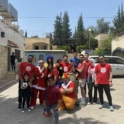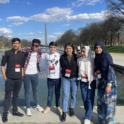West Bank YES alumni organized a GYSD event for orphaned children.
STORIES
Evaluating the Water School in Southwest Morocco: Learning from Experience

By Marouane Smaili, YES 2007-2008, Morocco, hosted by Ayusa in Tucson, AZ
In 2007, I was selected to be a foreign exchange student in the United States for an academic year through the Youth Exchange and Study (YES) program. The experience was pivotal for me, as it introduced me to many nuances of the American culture and changed me significantly. Through this journey, I developed a consciousness about myself as an active and potential agent for change. I nurtured an important value that was obscure to me growing up in Southwest Morocco: helping people through community service. In fact, this concept blends many values I cherish - patriotism, respect and equality - all of which are essential to a community’s development on a micro and macro-level.
Ever since my transformative YES experience, I committed myself to radiating the YES spirit and engaging myself in community service initiatives. The YES Program continued to assist me in this and I received a grant to conduct a project, the Water School summer camp, in my community and later attended the YES Alumni Transformational Leadership Training workshop. In June 2014, with Dar Si Hmad, a local development NGO active in southwest Morocco where I was an intern then and where I am now the Office Manager, we implemented the Water School summer camp for 46 children in the rural village of Agni N’Zekri southwest of Sidi Ifni in collaboration with the provincial delegation of the ministry of education in Sidi Ifni.
To draw a brief picture of the context and the community where the school takes place, there are three rudimentary rural primary schools servicing a total of 11 villages, each with only one teacher and one classroom. Unfortunately this can lead to poor educational standards, ranging from inadequate facilities to lack of water. The language of instruction is in Arabic instead of the Berber language, which is an additional barrier for many students as this is a predominantly Berber community. All of these conditions can make students passive listeners instead of active participants in their own learning.
The three-week summer camp was distinct from other camps organized in the region, because it focused solely on environmental issues related to water, a commodity that is rare locally due to intense drought. The student beneficiaries learned about water through fun hands-on activities with the broader aims of raising awareness and stimulating curiosity around the notions of water and the environment. Camp activities were a combination of educational games, field trips, Information and Communication Technology (ICT) and scientific workshops based on an experiential approach.
The Water School was a victorious achievement; the team was extremely satisfied as the camp drew to an end, and so were the little ones who demonstrated boundless enthusiasm throughout the three week camp. However, as positive as this statement may be, the experience lacked a formal structured evaluation to identify strengths and weaknesses in implementation to improve future management procedures and practices, Water School camps, and other related projects.
The Transformative Leadership Training workshop provided me a grant to evaluate the Water School summer camp. We were able to conduct on-site evaluation with the participants to complement the team’s input on the experience. We interviewed 17 participants on various components pertaining to the Water School, including activities, food, staff, and curriculum effectiveness. Our team designed an exhaustive interview guide, in which we simplified the concepts and tried as much as possible to translate them into a language that the children will understand and enjoy responding to.
Formally evaluating the Water School shed light on many aspects that were once blurred by our enthusiasm and commitment. The evaluation made clear minor management errors that will prove invaluable in the long run once corrected.
Analyzing children’s comments and feedback brought many things to light. Some children didn’t like some of the meals. The majority of children cited three activities that were for them the highlights of the experience. Some participants also suggested interesting activities to add to our curriculum such as planting and watering techniques and competitive sports activities.
It was interesting to notice patterns in both children’s positive and negative responses. Although it was challenging to convince the participants to highlight negative experiences from the Water School camp, we succeeded in doing so by highlighting some errors done in other projects and explaining how participant discussions helped improve our performance overtime.

Thanks to the fruitful results of this experience evaluating the Water School, the importance of project evaluation has been once again reconfirmed. As a result of our findings, the team at Dar Si Hmad has made important amendments to our project management procedures, incorporating new standards of project evaluation and insisting on evaluating all events, trainings, and projects we implement.
Upon the completion of the evaluation of the Water School, I reflected deeply on how evaluating not only projects but also our behavior and attitudes triggers a momentous change in our lives or in the way we manage projects.
Perhaps most importantly, I learned that the evaluation phase, even though placed last in most project management models, must be taken into consideration from the first phase of project preparation and planning. Thinking about the project’s outcome and how it should be measured objectively should be tied to setting goals and objectives, because only then can we set realistic goals and objectives which are SMART (Specific, Measurable, Achievable, Realistic and Timely).
This enriching experience would not have been possible without the support of many individuals and organizations for which I express my deepest gratitude. I would like to thank everyone who has contributed to the existence and sustainability of the YES Program: the Bureau of Educational and Cultural Affairs at the U.S. Department of State, American Councils for International Education, AMIDEAST, AYUSA and all other relevant organizations. I also extend my gratitude to the NGO Dar Si Hmad for supporting me in managing interesting development projects in Southwest Morocco. Last but not least, I owe deep respect and gratitude to the Transformative Leadership Training staff from the Salam Institute for Peace and Justice.





